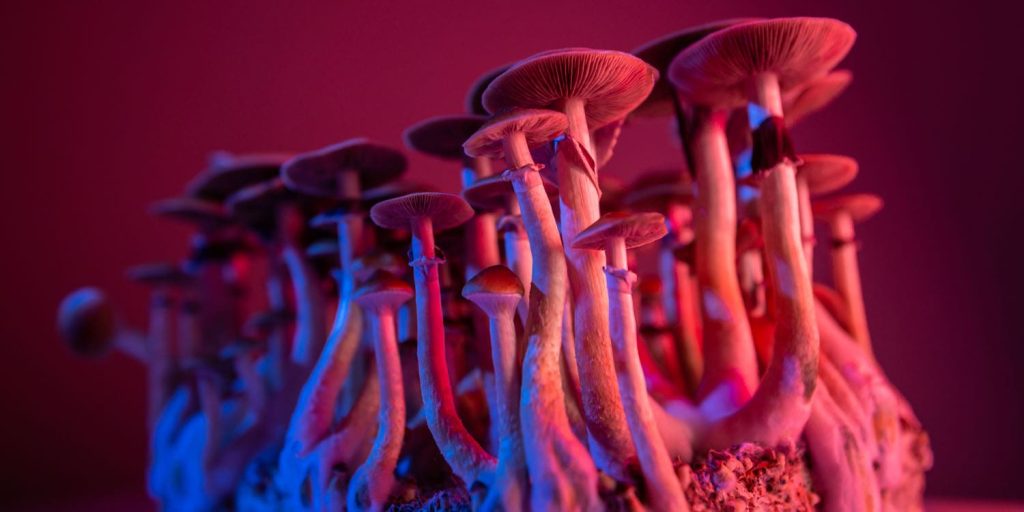A new study finds that psilocybin reduces alcohol consumption in rats by altering certain brain pathways, specifically the left nucleus accumbens. This suggests that psilocybin could be a useful treatment for reducing alcohol intake, but more research is needed to confirm its effectiveness in humans. The study is published in the journal Neuropsychiatry. brain.
Alcohol use disorder is a chronic illness characterized by an inability to control or stop drinking despite negative social, occupational, or health consequences. The disorder varies in severity and can lead to significant disability and increased mortality. Traditional treatments include behavioral therapy, medication, and support groups, but many people struggle to achieve lasting recovery, highlighting the need for more effective treatment options.
Psilocybin is a natural hallucinogen found in certain mushroom species. It has been used for centuries in various cultural and spiritual contexts. In recent years, scientific interest has been rekindled due to psilocybin’s potential therapeutic effects. When ingested, psilocybin is converted into psilocin, a compound that interacts with serotonin receptors in the brain and affects mood, perception and cognition.
Early clinical trials suggest that psilocybin-assisted therapy may be effective in treating a variety of psychiatric disorders, including depression, anxiety, and substance use disorders. Preliminary studies also suggest that psilocybin may help reduce alcohol intake, although the exact mechanism is unclear. New research aims to investigate the neurobiological effects of psilocybin, focusing specifically on its interactions with serotonin and dopamine receptors in the brain’s reward circuitry.
The study was conducted using 66 male Long-Evans rats, selected for their suitability for modeling human alcohol-drinking behavior. Rats were housed individually under controlled light-dark cycles and had unlimited access to food and water. The study was conducted in accordance with strict ethical guidelines for the care and use of laboratory animals.
First, rats were given access to a 20% ethanol solution for four weeks in a two-bottle choice setting to establish ethanol consumption. After this period, rats were trained to self-administer ethanol in operant cages, by pressing a lever to receive ethanol. This setting mimicked voluntary alcohol consumption in humans and allowed researchers to measure the rats’ motivation to consume alcohol.
The study was split into several experiments to isolate different variables. In one experiment, psilocybin was injected intraperitoneally (directly into the body cavity) at a dose of 1 mg/kg. In another experiment, psilocybin was microinjected into the left or right nucleus accumbens, a key brain region involved in reward processing. These injections were aimed at identifying the specific brain regions involved in psilocybin’s effect on alcohol intake.
To understand the molecular effects, the researchers measured the expression of various genes in the nucleus accumbens and prefrontal cortex four hours after psilocybin administration. The analysis focused on genes related to serotonin and dopamine pathways, which are important in regulating reward and addictive behaviors.
The researchers found that psilocybin induced significant changes in gene expression in the nucleus accumbens. In particular, genes encoding serotonin receptors and dopamine transporters were differentially expressed between the left and right nucleus accumbens. For example, the gene for serotonin receptor 2A (5-HT2A) was downregulated in the left nucleus accumbens, while brain-derived neurotrophic factor (BDNF) was upregulated in the right nucleus accumbens.
Administration of psilocybin significantly reduced alcohol self-administration: rats receiving psilocybin pressed the lever 48% less and consumed 51% less total alcohol compared to rats receiving saline, demonstrating that the effects of psilocybin are powerful and go beyond just being injected directly into the brain.
Interestingly, microinjections of psilocybin into the left nucleus accumbens reduced lever pressing for alcohol by 38% and total alcohol intake by 39%. In contrast, injections into the right nucleus accumbens produced no significant changes, highlighting the importance of the left nucleus accumbens in mediating these effects.
The involvement of serotonin receptors was confirmed when the effects of psilocybin were blocked by pretreatment with the serotonin receptor antagonist ketanserin. Rats administered ketanserin prior to psilocybin did not show the usual reduction in alcohol consumption, indicating that the effects of psilocybin are mediated via the serotonin receptor pathway.
This study provides evidence that psilocybin can reduce alcohol intake in rats by acting on specific brain pathways. By altering gene expression in the nucleus accumbens and engaging serotonin receptors, psilocybin appears to reduce the rewarding properties of alcohol, leading to reduced intake.
Although these findings reveal a potential mechanism by which psilocybin reduces alcohol intake, there are important physiological and behavioral differences between rats and humans that must be considered. Therefore, the translation of these findings to the treatment of alcohol use disorder in humans will require extensive clinical studies to confirm efficacy and safety in human populations.
the study, “Psilocybin reduces alcohol self-administration via selective activation of left nucleus accumbens 1 in rats” is written by Jérôme Gembrun, Romain Bordy, Gregory Fouquet, Virginie Gembrun and Michaël Naassira.


